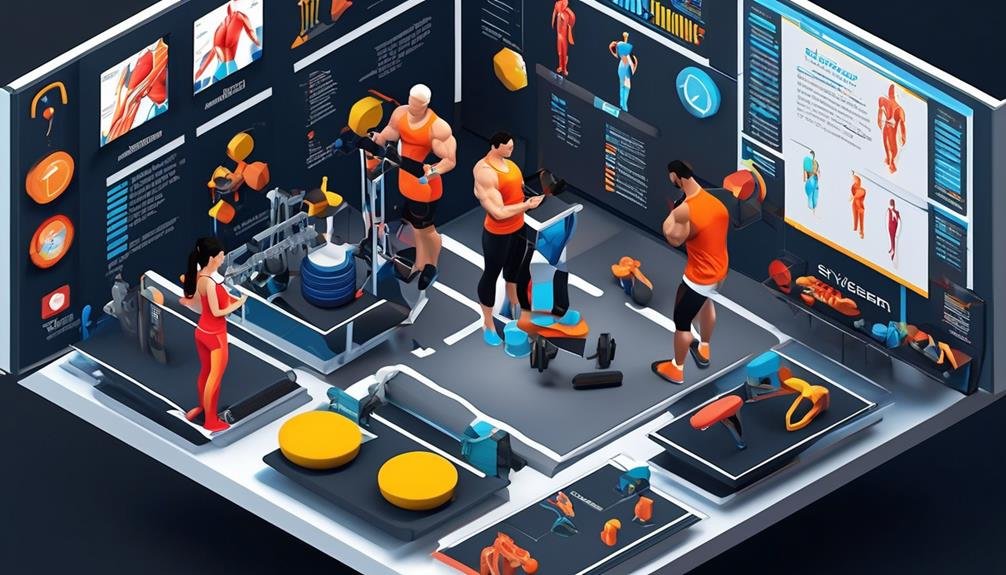Disclaimer: This content is for informational purposes only and does not replace professional medical advice, diagnosis, or treatment. Always consult a qualified healthcare provider before beginning any new exercise program.
Like a compass guiding you through uncharted territory, a virtual personal trainer can be the tool you need to navigate the world of fitness.
But with so many options out there, how do you know which one to choose? Well, it all comes down to credentials.
The credentials a virtual personal trainer holds can make all the difference in your fitness journey. From education and expertise to communication skills and client success stories, these qualifications can determine whether you achieve your fitness goals or get lost in a sea of virtual trainers.
So, let's explore what credentials a virtual personal trainer should have and why they matter.
Key Takeaways
- Accredited certification programs are necessary for becoming a virtual personal trainer and ensure knowledge and skills for effective training.
- Expertise in fitness and exercise, including anatomy, physiology, biomechanics, nutrition, and programming, is essential for providing effective virtual training sessions.
- Knowledge of anatomy and physiology is crucial for creating effective workout programs, considering individual limitations and goals, and preventing injuries.
- Experience with virtual training platforms, proficiency in virtual communication tools, and the ability to create engaging virtual workouts are important for a virtual personal trainer.
Education and Certification
To become a virtual personal trainer, it's essential to obtain the necessary education and certification. This ensures that you have the knowledge and skills required to provide effective training and guidance to your clients.
A solid educational foundation is crucial in understanding anatomy, physiology, nutrition, and exercise science. Look for certification programs that are accredited by reputable organizations, such as the National Academy of Sports Medicine (NASM) or the American Council on Exercise (ACE). These certifications demonstrate that you have met the industry standards and possess the expertise needed to deliver quality virtual training sessions.
When choosing an education program, opt for one that offers comprehensive coursework in exercise science, program design, and client assessment. It should also include practical training and experience working with clients. Additionally, consider programs that provide education on virtual training platforms and technologies, as this will be a key aspect of your role as a virtual personal trainer.
Once you have completed your education, it's crucial to obtain the necessary certification. This validates your knowledge and expertise, giving your clients confidence in your abilities. It also sets you apart from uncertified trainers in a saturated market.
Remember to maintain your certification by completing continuing education courses to stay updated on the latest advancements in the field.
Expertise in Fitness and Exercise
Once you have obtained the necessary education and certification, your expertise in fitness and exercise will be the key to providing effective virtual training sessions. As a virtual personal trainer, your clients will rely on your knowledge and understanding of fitness principles to guide them towards their health and fitness goals.
Your expertise in fitness and exercise should encompass a wide range of topics, including anatomy, physiology, biomechanics, nutrition, and exercise programming.
To effectively train clients virtually, you need to have a deep understanding of human movement and the ability to assess and correct form through video analysis. This requires knowledge of proper exercise technique and the ability to identify common movement compensations and imbalances. Additionally, you should be well-versed in various training methods and be able to tailor programs to meet the specific needs and goals of each client.
Being knowledgeable in the latest research and trends in the fitness industry is also crucial. Staying up-to-date with advancements in exercise science allows you to provide evidence-based recommendations and programming to your clients. This includes understanding the benefits and limitations of different training modalities, such as strength training, cardiovascular exercise, and flexibility training.
Furthermore, your expertise should extend beyond exercise to encompass nutrition and lifestyle factors that contribute to overall health and well-being. Understanding the role of nutrition in achieving fitness goals and being able to provide basic dietary guidance can enhance the effectiveness of your virtual training sessions.
Knowledge of Anatomy and Physiology

Having a solid understanding of anatomy and physiology is essential for a virtual personal trainer. As a trainer, you need to know how the body functions, how muscles work together, and how different systems interact. This knowledge allows you to create effective workout programs and address specific client needs.
Anatomy refers to the study of the body's structure, including bones, muscles, organs, and their locations. Understanding anatomy helps you identify muscle imbalances, assess posture, and prevent injuries. For example, knowing the muscles involved in a squat exercise can help you correct form and target specific muscle groups.
Physiology, on the other hand, focuses on how the body functions and adapts to exercise. It includes understanding energy systems, cardiovascular function, and the effects of exercise on different body systems. This knowledge helps you design workouts that improve cardiovascular endurance, strength, and flexibility, while considering individual limitations and goals.
Experience With Virtual Training Platforms
With a solid understanding of anatomy and physiology, you can now explore your experience with virtual training platforms. As a virtual personal trainer, your ability to navigate and utilize these platforms is essential for providing effective and engaging workouts to your clients.
Here are three key aspects of experience with virtual training platforms that you should possess:
- Familiarity with various virtual training platforms: Your experience should include working with different platforms such as Zoom, Skype, or specialized fitness apps. Each platform has its own features and capabilities, and being familiar with multiple options allows you to adapt and cater to your clients' preferences.
- Proficiency in virtual communication tools: Effective communication is crucial in virtual training. You should be well-versed in using video conferencing tools, chat functions, and screen sharing to provide clear instructions, answer questions, and offer feedback during sessions. Being confident in utilizing these tools ensures a seamless training experience for your clients.
- Ability to create engaging virtual workouts: Virtual training platforms offer unique opportunities to create dynamic and interactive workouts. You should have experience in incorporating multimedia elements such as videos, images, and interactive exercises to keep your clients motivated and engaged throughout their sessions.
Communication and Interpersonal Skills

Effective communication and strong interpersonal skills are crucial for virtual personal trainers to successfully connect with and motivate their clients. As a virtual personal trainer, your ability to effectively communicate and build rapport with your clients is essential for their success and satisfaction. By employing excellent communication and interpersonal skills, you can create a positive training experience that fosters trust, engagement, and ultimately, helps your clients achieve their fitness goals.
One key aspect of communication is active listening. When you actively listen to your clients, you demonstrate that you value their input and concerns, which helps to establish a strong client-trainer relationship. Additionally, effective communication involves clear and concise instructions, ensuring that your clients understand the exercises, techniques, and goals of their training program.
Interpersonal skills are equally important. By being empathetic and understanding, you can create a safe and supportive environment where clients feel comfortable sharing their challenges and progress. Furthermore, being adaptable and flexible in your approach allows you to tailor your training methods to the unique needs and preferences of each client.
Table:
| Communication Skills | Interpersonal Skills |
|---|---|
| Active listening | Empathy |
| Clear and concise instructions | Adaptability |
| Effective questioning | Understanding |
Client Success Stories and Testimonials
Client success stories and testimonials provide valuable evidence of the effectiveness of virtual personal trainers in helping clients achieve their fitness goals. These stories and testimonials showcase real-life experiences and outcomes, making them a powerful tool in evaluating the capabilities of a virtual personal trainer.
Here are three reasons why client success stories and testimonials are important:
- Inspiration and motivation: Reading about the success that others have achieved through virtual personal training can inspire and motivate you to embark on your own fitness journey. Success stories serve as proof that virtual training can yield tangible results and help you overcome any doubts or reservations you may have.
- Social proof: Testimonials from satisfied clients act as social proof, validating the expertise and effectiveness of virtual personal trainers. When you see others achieving their goals and expressing their satisfaction, it provides reassurance and confidence in the trainer's abilities.
- Personalization and relatability: Client success stories and testimonials often highlight the personalized approach taken by virtual personal trainers. They showcase how trainers tailor programs to meet individual needs, address specific challenges, and provide ongoing support. These stories also allow you to relate to the experiences of others, making the journey feel more accessible and attainable.
Ongoing Professional Development

To ensure your virtual personal trainer remains effective and knowledgeable, they continuously engage in ongoing professional development. As the fitness industry evolves and new research emerges, it's crucial for trainers to stay up-to-date with the latest trends, techniques, and scientific findings. Ongoing professional development allows trainers to expand their knowledge, refine their skills, and provide you with the best possible guidance and support.
Virtual personal trainers may pursue various avenues of professional development. They often attend workshops, seminars, and conferences that focus on topics such as nutrition, exercise physiology, and coaching methodologies. Additionally, they may participate in online courses or webinars offered by reputable fitness organizations to enhance their expertise in specific areas.
Continual learning also involves staying current with industry publications and research articles. By regularly reading and studying these materials, trainers can integrate evidence-based practices into their training programs, ensuring that they're grounded in the latest scientific knowledge.
Furthermore, virtual personal trainers might seek out mentorship opportunities or engage in peer-to-peer learning. Collaborating with other professionals in the field allows trainers to exchange ideas, share best practices, and learn from one another's experiences.
Frequently Asked Questions
What Is the Average Cost of Hiring a Virtual Personal Trainer?
The average cost of hiring a virtual personal trainer can vary depending on factors such as experience, qualifications, and services offered. It's important to research and compare prices to find a trainer that fits your budget and meets your needs.
How Do Virtual Personal Trainers Create Personalized Workout Programs for Their Clients?
To create personalized workout programs, virtual personal trainers assess your fitness goals, current fitness level, and any limitations or injuries. They then design a program tailored to your needs, providing exercises, sets, and reps for each workout.
Can Virtual Personal Trainers Provide Nutritional Guidance and Meal Plans?
Yes, virtual personal trainers can provide nutritional guidance and meal plans. They have the knowledge and expertise to help you create a balanced diet and meet your specific dietary needs.
What Equipment Do Clients Need to Have for Virtual Training Sessions?
To have successful virtual training sessions, you need the right equipment. Make sure you have a stable internet connection, a device with a camera and microphone, and any specific workout equipment your trainer recommends.
How Do Virtual Personal Trainers Ensure the Safety and Effectiveness of Their Clients' Workouts Without Being Physically Present?
To ensure safety and effectiveness without being physically present, virtual personal trainers rely on their expertise and experience. They follow industry guidelines, provide clear instructions, offer modifications, and regularly check in with clients for feedback and progress updates.
Conclusion
In conclusion, when looking for a virtual personal trainer, it's important to consider their:
- Education, certification, expertise in fitness and exercise, and knowledge of anatomy and physiology.
- Experience with virtual training platforms.
- Communication and interpersonal skills.
- Client success stories and testimonials.
Additionally, ongoing professional development is crucial to ensure they stay up-to-date with the latest advancements in the field.
By selecting a trainer with these credentials, you can feel confident in their ability to guide you towards achieving your fitness goals.



